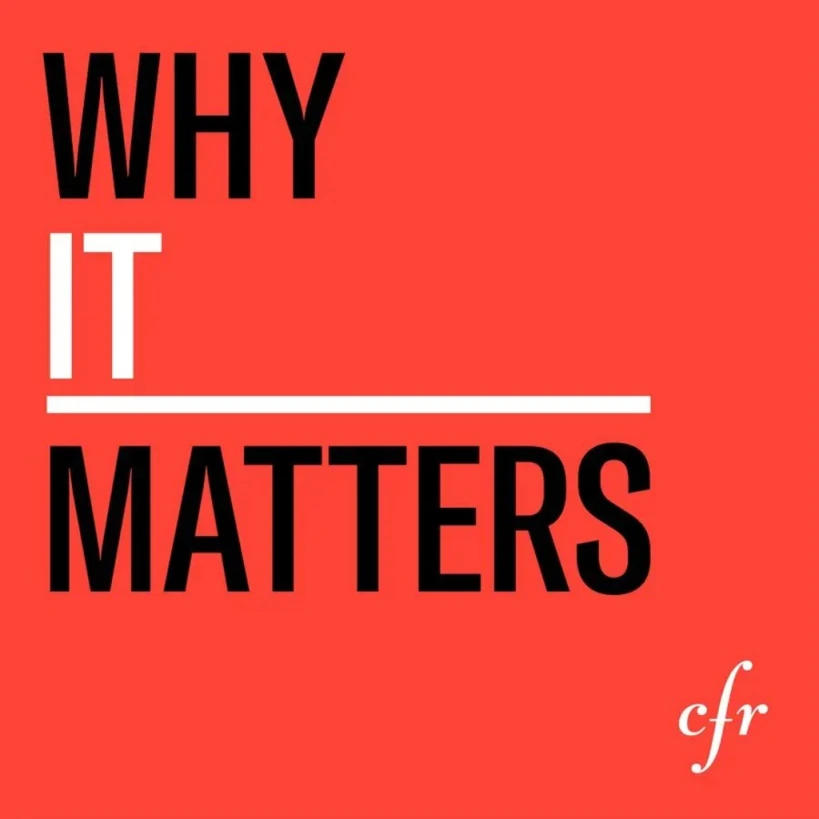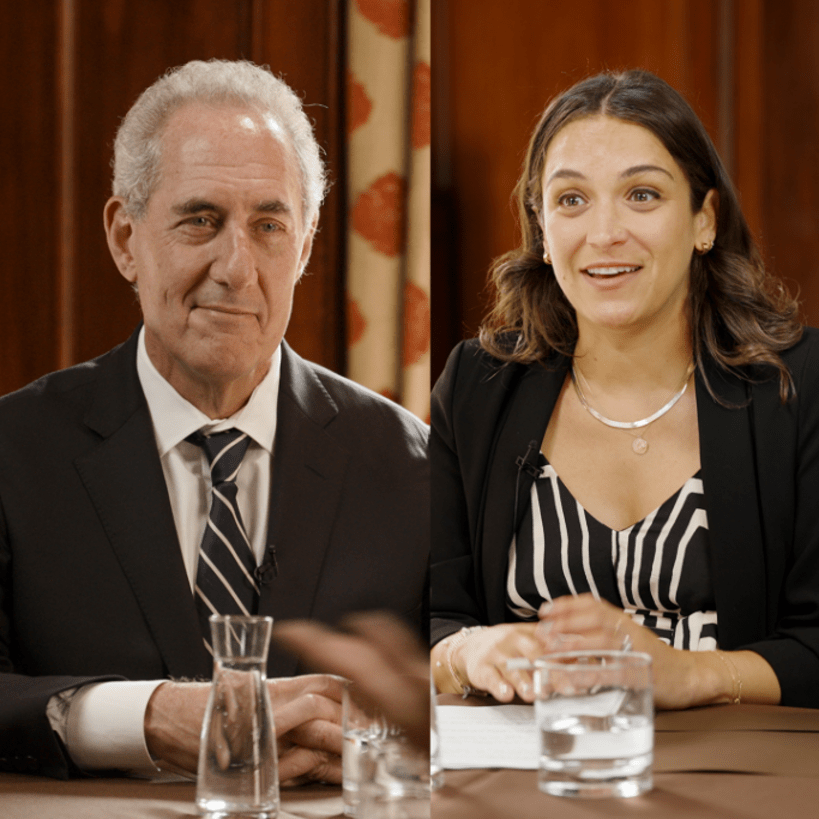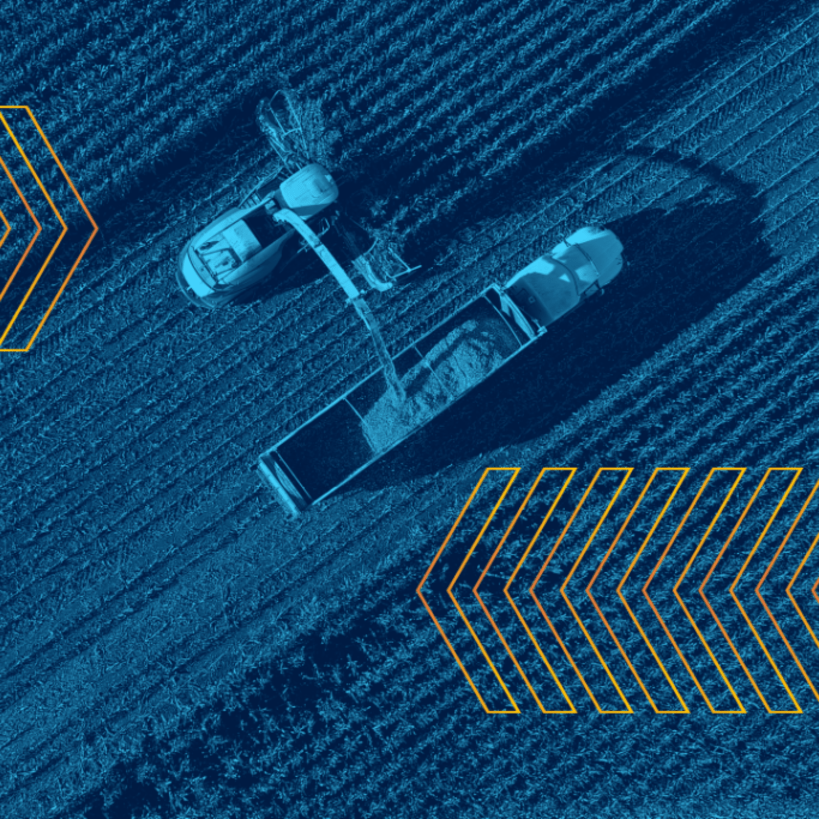Trouble Brewing for Coffee
Beware, coffee lovers: climate change could disrupt your precious morning cup of joe. Coffee beans could lose half of their farmable land by 2050 as temperatures and weather patterns become more extreme and less predictable. This could lead to scarcer yields and pricier brews. But there is hope that unique varieties and novel farming techniques could change coffee’s destiny. The transition will require massive investments and many observers question whether the industry can meet the challenge.
Published
Host
- Gabrielle SierraDirector, Podcasting
Author
- Aaron P. DavisSenior Research Leader of Crops and Global Change, Royal Botanic Gardens, Kew
- Amanda GrossiSenior Africa Regional Manager, International Research Institute for Climate and Society, Earth Institute, Columbia University
- Jonathan MorrisResearch Professor in History, University of Hertfordshire
Supervising Producer
- Asher RossLead Content Strategist
Audio Producer and Sound Designer
Associate Podcast Producer
- Rafaela Siewert
Show Notes
The world loves coffee, but the crop is facing a new challenge as climate change threatens traditional agricultural practices globally. The consequences go beyond risking coffee lovers’ daily cup by endangering small-scale farmers who rely on the crop for their livelihoods and economic survival. Coffee is getting even more popular, but scientists and farmers are just starting to think about how to modernize agricultural techniques and reintroduce more sustainable varieties for new climates.
From CFR
Alice C. Hill and Madeline Babin, “What the Historic U.S. Climate Bill Gets Right and Gets Wrong”
From Our Guests
Jonathan Morris, Coffee: A Global History, Reaktion Books
Read More
Anthony King, “Forest Plantations Are a Potent Blend for Coffee Production,” Horizon
Sarah Gibbens, “What Climate Change Means for the Future of Coffee and Other Popular Foods,” National Geographic
Tatiana Schlossberg, “Coffee and Climate Have a Complicated Relationship,” New York Times
Watch and Listen
“‘Amazing’ New Beans Could Save Coffee From Climate Change,” Voice of America
“How Climate Change Is Threatening the Coffee Industry,” CFR Education
Transcript
Gabrielle SIERRA: I have to ask, how do you take your coffee?
Jonathan MORRIS: I drink my coffee straight and black. If it’s not good enough to drink black, it’s not good enough coffee.
Aaron DAVIS: Well, it depends on the time of the day. I’m not really super fussy, I guess, but I’ll drink a milky coffee in the morning, but generally I like straight filter coffee, no milk, no sugar.
Amanda GROSSI: Oh my gosh. How do I take my coffee? I take my coffee over to my neighbor, or a friend because I don’t even like coffee.
SIERRA: Oh my gosh!
GROSSI: I don’t even like coffee. It is shocking, but that’s the thing, you know, you don’t have to be a coffee drinker to care about this issue we’re talking about today of how climate is impacting coffee.
I can’t get through the day without at least two strong cups of coffee. And I take with the tiniest whisper of milk.
And it isn’t just me. In the US alone, an estimated 66 percent of adults drink coffee everyday.
Technically, coffee is a luxury, right, it provides nothing that human beings need nutritionally. But to many coffee drinkers it feels essential. Global coffee culture is deeply ingrained in our daily lives, from Los Angeles to Osaka.
And for millions of coffee farmers around the world, it is essential, providing a crucial source of income that is increasingly under threat.
Like so many other crops we grow, coffee is seriously threatened by climate change. It’s a delicate plant, and all around the world, the land on which it can be grown is shrinking. If things continue as they are, the stuff we buy at the store could become very expensive, or very bland, or even disappear from our lives altogether.
I’m Gabrielle Sierra, and this is Why It Matters. Today, will climate change take coffee off the menu?
CBS Mornings: If you’re watching us with your first cup of coffee, take note. A warming planet could make that drink harder to find.
ABC News: Your morning cup of Joe could become a thing of the past. Experts say the main bean used to make coffee is drying up.
ABC News: Coffee drinkers out there, I am feeling your pain on this one. No matter how you like your coffee, the coffee beans may be going…
MORRIS: At the moment 50% of the areas that we currently grow coffee in will be severely impacted by climate change by 2050, to the point of becoming probably uneconomic to grow coffee in. So it’s a massive challenge for the coffee industry.
This is Jonathan Morris, he’s a coffee historian, yep those exist! And he’s a Professor at the University of Hertfordshire in the UK. And what he just mentioned is bad news because we consume a lot of coffee. The world drinks about 500 billion cups of coffee a year. And with 80 percent of coffee grown by 25 million small farmers, that means a lot of people stand to lose their way of making a living.
MORRIS: So, in coffee you’ve got the environmental challenges, both the challenges involved in climate change, but also the challenges of coffee growing per se and its impact on the environment. You’ve got, if you like, the economic challenges, particularly the challenges of a trading market, and you’ve got what I would call the social challenges, which move beyond the economic to, sort of, you know, how do we want our societies to look, how do we want to help particular societies survive, those kinds of things, and how do we help them transition as well? Because transitioning into a place of more profitability is actually a difficult thing to do.
And that dilemma is particularly important in the world’s biggest coffee-producing nations - Brazil, Vietnam, Columbia, Indonesia, and Ethiopia.
GROSSI: 125 million people worldwide depend on coffee for their livelihoods.
This is Amanda Grossi.She is a researcher and project manager at the International Research Institute for Climate and Society at Columbia University in New York City.
GROSSI: So this could be farmers, roasters, sellers, and pretty much anyone involved in the coffee value chain. So it’s a lot of people.
And a surprising number of those people are women.
GROSSI: Globally women operate about 20 to 30% of coffee farms, and represent up to 70% of the labor force in coffee. Empowering women financially has benefits beyond themselves to also that of their families and especially their children, right? So there’s this social and women’s empowerment aspect. But not only is coffee a key source of income for these millions of people, but because of this, it’s actually critically important for addressing issues of food security and many vulnerable contexts. So I’m not saying it’s important because people you know need to eat or drink coffee. I’m saying the use of the income they get from selling the coffee, which is a cash crop to buy food, to keep themselves from going hungry, to feed their families, and ultimately keep themselves food secure and nourished is very important. And that this is the case for millions of people around the world.
Alright before we go any further let’s go back to basics. How is coffee farmed?
SIERRA: Can you quickly outline for me the path from farm to table? How is coffee made?
MORRIS: So, there are supposedly 25 stages in that.
SIERRA: Okay.
MORRIS: I’ll try and simplify a little bit. Okay?
SIERRA: Yeah.
MORRIS: So, look, when we start by what we call a coffee tree, it’s really a bush. It’s probably about eight to 10 meters high. That has a fruit which we call a cherry. When the cherry turns red, we pick that fruit. Inside the fruit are the seeds. They’re what we now call the beans. Once we have taken off the fruit, dried out the seeds, we take the beans and hull them. So we knock off the parchment surrounding them and at that point they are then traded through various ways through various middlemen. They get to a shipping point and are then shipped over to the final country, consumer country. There they’re roasted. And then various coffee beans can be sold and prepared in the multiple ways that we prepare coffee.
SIERRA: For 25 steps, that was very succinctly put.
Coffee has been a part of daily life for generations, but in recent years, it’s emerged as a massive and lucrative industry, serving discerning customers who are willing to pay a lot for bougie brews.
Heck, Starbucks is a multi billion dollar company! Sure there are some like me, who drink their coffee lukewarm and days old! But for others, coffee has become a passion.
MorganDrinksCoffee: The United States Barista Championship is less than one week away at this point, which is very, very exciting.
Coffeefusion: Welcome to another episode of Coffee Vision. This week we’re going to look at latte art basics.
Emilee Bryant: And as you’re pouring, the milk is coming out of the pitcher and into the coffee, and when it’s too high, it sinks. But when you back down to the right point...
And as this interest increases, coffee itself faces a crisis. Clearly more than ever, people love their fine coffee, but no matter how you take it the quality of the end product starts back at the farm, with the first of those 25 steps. And that brings us to the beans.
MORRIS: Okay. So, look, there are two types of commercially used coffee at the moment, or very much two dominant ones. One is the original coffee plant that we’ve always used. It’s called arabica coffee. Ironic because it’s actually originally from Africa, but we first came across it in Arabia. The arabica coffee is more vulnerable to climate change. It’s very sensitive to excessive heat, but it’s also, as all coffee plants are, incapable of surviving anywhere where there’s frost. It’s a little like, if you like, wine, in the sense that arabica coffee can assume a lot of flavor profiles from the way that it’s grown, all these kind of things, very, very specific. There is another form of coffee, somewhat cheaper, somewhat hardier. It’s called robusta coffee commonly. It’s still completely sensitive to frost. It’s slightly hardier in terms of temperature, and it’s much better in disease resistance. It doesn’t, by and large, taste as good. The tasting notes are not so clear, but the biggest difference between the two is that the robusta coffee has about twice the caffeine of the arabica coffee.
SIERRA: Whoa.
MORRIS: So yeah. If you’re drinking a robusta blend, you’re getting significantly more caffeine in there.
What better way to understand this than by trying it out? One of our producers, Rafaela Siewert, gave me a blind taste test. So we had one cup arabica, one cup robusta, and one that’s blend, and we wanted to see if I could really tell the difference. And I thought I could.
Rafaela SIEWERT: This button? Are we sure it’s good? Okay I think so.
SIERRA: Yep.
SIEWERT: Cool.
SIERRA: Welcome to my world. Okay, so we are here in our office in New York. And I am sitting at the table with my producer Rafaela.
SIEWERT: Hello.
SIERRA: And I am about to endure a blind taste test of different types of coffee.
SIEWERT: That’s right.
SIERRA: I have never done a coffee tasting. I’ve done wine tasting.
SIEWERT: Okay. Scotch tasting?
SIERRA: I’ve done, yes, I’ve done a whiskey tasting.
SIEWERT: Whiskey, got it.
SIERRA: I’m seeing a theme.
SIEWERT: I’m very excited to administer.
SIERRA: I’m excited.
SIERRA: Yeah.
SIEWERT: You’re going to taste each. And do a little guessing and see if you can tell the differences.
SIERRA: I think I can tell.
SIEWERT: You think?
SIERRA: No I don’t know.
SIERRA: So we have them in three identical Council on Foreign Relations mugs.
SIEWERT: Yes.
SIERRA: So I have no idea which they are.
SIEWERT: Totally black coffee. Sorry, no whispers of milk. All right. So let’s start here is your first cup.
SIERRA: Okay.
SIEWERT: So take a first sip.
SIERRA: Oh, wow. Okay, this is, like, very taste forward. Is that something that you say with coffee?
SIEWERT: Fashion forward, taste forward.
SIERRA: You know, smells good. It’s a little bitter, but you know, it’s coffee.
SIEWERT: Okay. Next cup.
SIERRA: Okay, second cup. Here we go. Oh, funny. This one really doesn’t have as much of a smell.
SIEWERT: First impressions?
SIERRA: Wow, much smoother. Not bitter. This one. The first one was absolutely a bitter coffee.
SIEWERT: Interesting. Third one.
SIERRA: Okay, this one is like a little, a little bitter. Okay, so here’s what I think. Okay. Blend.
SIEWERT: Yes.
SIERRA: Arabica. Robusta
SIEWERT: You mixed Arabica and Robusta.
SIERRA: What?
SIEWERT: Yes!
SIERRA: No way. Haha. Wow, joke’s on me.
SIEWERT: Well, this is telling to the coffee industry. That some of us like robusta more, and it’s better.
SIERRA: Yeah. And it’s I will say like, you can taste more like it’s a stronger flavor in the Arabica like It tastes like a taste as opposed to robusta. It does remind me of like, a more mild, like a comforting sort of diner-y coffee. Right versus you know.
SIEWERT: Something really homey about a diner coffee.
SIERRA: Yeah yeah. Oh and I got the blend.
SIEWERT: You got the blend.
SIERRA: Okay, I got this so wrong.
SIEWERT: So what’s what’s the takeaway? How do you? What do you we think about this?
SIERRA: I’m rethinking all of my coffee choices.
SIEWERT: Well. You know what, it’s in your best interest? Because I think that’s the one that’s going to stick around a little longer in the climate crisis.
SIERRA: That’s perfect.
SIEWERT: So you’re good. The rest of us? I don’t know. But idk, but you’re good.
SIERRA: If we could go back just a step, could you break down how the two major elements of climate change, temperature and extreme weather, will affect coffee production?
MORRIS: Basically, as we hit higher temperatures, the plants‘ yield goes down. So it won’t be a kind of an all or nothing moment. You won’t just see coffee dying, but what you’ll see is reduced yields, and as the yields reduce at a certain point obviously it becomes uneconomic to produce the coffee.
This is important. Because coffee crops don’t have to utterly fail in a region in order to disappear. They just have to become so difficult to grow that farmers give up and move on to another livelihood. As temperatures increase, farms produce fewer and lower quality beans, pushing them closer to crisis.
ABC News: Brazil is the world’s leader in coffee production. And bad weather last year including drought and frost has left farmers there with much less crop than usual… and a number of big coffee shops large and small have upped their prices and now those prices are set to climb even higher. The average price for a pound of coffee today is $6.11, a year ago it was 4.56 cents.
MORRIS: Extreme climate change in Brazil that has massively impacted the coffee price recently is frost. So if there’s a frost and it kills off coffee plants, then you have a real problem because it takes five years to get those plants back productive. So that’s five years with no income. So, maybe you can do that if you’re a big plantation and you have a nice reserve, but you can’t do that as a small farm.
SIERRA: That’s a long time.
MORRIS: Yeah. And so, the disaster in Brazil was followed by a drought disaster. So it was about the two worst things that could happen. If there isn’t enough rain, there’s no flowering. If there isn’t enough rain, there’s no maturing of the coffee cherry in the right way.
Without mitigation and adaptation, events like Brazil’s crop failure - due to both frost and drought - are going to happen more often, more intensely, and in more places. All over the world it will be too hot or too cold, there will be too much water, or too little, to grow the crops that we are all used to. At the same time, extreme weather will also increase the prevalence of plant disease. And it’s not just a particular crop or year, but the existence of certain coffee species all together. This is of particular concern in Ethiopia, which is in one of the world’s most important coffee regions.
GROSSI: So what if I told you that Ethiopia is the birthplace of coffee, the origin of coffee, and the world’s main storehouse of genetic diversity for Arabica coffee, and that furthermore, this is under threat due to climatic changes, and that this is going to affect the taste of your coffee? Oh no. I think some people just had a heart attack. So coffee that ripens faster such as with higher temperatures actually has less time to develop complex flavor profiles. According to some research rising temperatures, and decreasing rainfall could actually render as much as 60% of Ethiopia’s coffee growing areas unsuitable for cultivation by the end of the century. So from a conservation standpoint, the entire genetic diversity of indigenous or wild Arabica coffee is confined mainly in this Afromontane rainforest that’s located in the west and east of this great Rift Valley in Africa. So Ethiopian coffee genetic materials are really important for these different flavor profiles that I just talked about, but also in breeding programs for producing these high productivity and disease resistant coffee varieties around the world.
So what can be done? Well obviously as always we need to mitigate, but we can also adapt. And for that, there are three primary options.
DAVIS: One of those is to move coffee. Move it somewhere cooler, wetter. And in somewhere like Ethiopia, moving up in elevation up a mountain, does give you quite a degree of resilience.
This is Aaron Davis, he is a Senior Research Leader of Crops and Global Change at Kew Royal Botanic Gardens. Basically he is a top scientist studying crops within the context of climate change.
DAVIS: But moving coffee comes at a cost, because it’s difficult moving people, it’s difficult moving crops. So there are all sorts of social and economic considerations in play there. Now the second option is to modify the farm.
GROSSI: At the farm solutions are really, really, really important. So one of the easiest and most effective things that you can do as a climate smart practice with coffee, is to have shade grown coffee because when you have a tree it helps to regulate the temperature of your coffee farm.
Actually, measures like this are already being implemented. Building out a tree canopy above your coffee crop is a way to keep them shaded naturally throughout longer and hotter seasons. It’s actually called agroforestry. And we are seeing this in effect in countries like Ethiopia.
GROSSI: But beyond temperatures, we’re also talking about you know impacts with rain. Sometimes too little rain, sometimes not too much rain. So too much rain, you can do things like, terracing for coffee, or what we might call, Q-vetting, changing the earth works and soil around the coffee plant to make sure when it does rain the plant is able to harvest that water, and trap that water efficiently for its growth. And if it’s not raining enough for example, you can do things like, cover crops and mulching and things like this. So I’ll say there’s a lot of different things that you can do. And a lot of them are really quite simple, but they do have a cost tied to them if you’re planting a tree, or if you’re needing to pay someone even more labor to work on a farm because it’s hotter outside than, and you’re not making enough money to begin with this seemingly minimal cost ends up actually adding up to be quite a lot. They’re having to increase their labor, they’re having to increase their material inputs, and things like this but at the end of the day if this extra effort they’re putting in for adaptation is not reflected in price, you’re talking about not fully supporting the profitability of farmers and their sustainability in the long run.
SIERRA: Right. It’s not just up to the farmers to save us all.
GROSSI: No, it’s really not. It’s really not. So these big coffee companies, Starbucks, Nespresso, et cetera, all these big coffee companies should be investing money back into research, and not only research, but profits as well back into implementing climate smart practices and supporting solutions that are actually actionable. To acknowledge that there’s a cost associated with these climate changes and variability, and help us to internalize those costs so that farmers don’t have to do that. But we definitely have the resources. I think what we need is some more research, and some more will, and some more people implementing these actually meaningful solutions.
A solution must include a marriage of private sector investment in new technology and carry through to governmental policies that then incentivize and support farmers as they experiment and transition. All of that said, there is also one last option. Starting from scratch. Kind of.
DAVIS: The third option is to change the crop itself. So adopt a different species, other than Arabica or Robusta, that’s more tolerant of higher temperatures and lower rainfalls. I mean, one of the good bits of news for coffee sustainability is the fact that we’ve got another 128 species.
SIERRA: Oh, all right.
DAVIS: And within that species diversity, there are some useful species that could help us adapt coffee farming, at least to mid-century, and perhaps a little bit beyond. The main focus is on those species that were cultivated at scale, maybe 100, 150 years ago, almost made it as crop plants. And that might work today under accelerated climate change. And we have like three or four really good candidates in that group.
SIERRA: So how come these didn’t stick before?
DAVIS: It’s not a great analogy, but I guess it’s a bit like electric cars invented over a hundred years ago. There were several models a hundred years ago, but really didn’t stick because there was no need for them. Why do you need an electric car when you’ve got plenty of hydrocarbon? But electric cars are coming into the fore now, of course. And I think that’s the same with coffee. And what you see if you look at the history of coffee is that innovation and replacement only really takes a hold when there’s a crisis.
DAVIS: The main focus of the work we are doing right now is on Liberica and the other is Stennophylla coffee, which is an interesting species in that it, like Liberica, was grown and exported at the end of the 19th century, beginning of the 20th century, and then disappeared because Robusta came along. But it grows and crops in a substantially warmer environment... up to 6.8 degrees Celsius warmer. That’s the mean annual temperature.
SIERRA: The world might be on fire, but those coffee plants they’ll keep going.
DAVIS: That’s why you need to look at the climate change projection work and work around a coffee development program that’s in sync with those changes. Otherwise it’s just kind of wasting your time, I think. So there is potential to use this diversity to adapt coffee farming to climate change, but we need to start on that work as soon as possible. In fact, we should have started 30 years ago, but we really need to move quickly because time is certainly running short.
SIERRA: In the long term, is coffee destined to be a casualty of climate change? And if so, can science save coffee?
DAVIS: Well, I think... Can science save coffee? Yes and no. I think one of the key things we need to really consider is trying to minimize risk for not only coffee, but for many, many other crops. If we don’t do something about greenhouse gas emissions, if we aren’t serious about carbon neutrality, then any of the measures that I’ve talked about will be inconsequential. And I really believe that. If we are to have some future for humankind, let’s face it, then we need to tackle climate change at its very roots.
Of course, coffee is just one example. Farmers everywhere are questioning how they will grow their crops while facing a world with new climate realities. Wheat, corn, soy, wine grapes, peaches, almonds, the list goes on. And while it becomes harder and harder to farm in traditional ways, the world’s population grows. That means more mouths to feed, all while the world’s leading scientists try to figure out how to adapt the way we grow our food.
We’ve said it before but this whole transition process is sticky and complicated. But maybe if people get shook by the idea of an empty cup of coffee, we will be motivated to make some important changes before it’s too late.
Our associate podcast producer Rafaela is leaving us for new adventures and so in honor of this she will be reading us out. We will miss her dearly.
Hi everyone this is Raf from the taste test and I will be reading us out today, since this is my last episode with the team. Which is so bittersweet, because I love everyone so much and I’m going to miss them incredibly.
For resources used in this episode and more information, visit CFR.org/whyitmatters and take a look at the show notes.
If you ever have any questions or suggestions or just want to chat, email us [email protected].
You can subscribe to the show on Apple Podcasts, Spotify, Stitcher, or wherever you get your audio. If you have the time and love the show you could leave us a review while you are there - it helps us get noticed, we also just love to read them.
Why It Matters is a production of the Council on Foreign Relations. The show is produced by Asher Ross and Gabrielle Sierra. Our sound designer is Markus Zakaria.
I, Rafaela Siewert, am the associate podcast producer.
Our intern this semester was Mormei Zanke.
Robert McMahon is our Managing Editor, and Doug Halsey is our Chief Digital Officer. Extra help for this episode was provided by Elissa Fielding and Claire Klobucista.
Our theme music is composed by Ceiri Torjussen. We’d also like to thank Richard Haass, Jeff Reinke and our co-creator Jeremy Sherlick.
For Why It Matters, this is Rafaela Siewert signing off. See you around!






